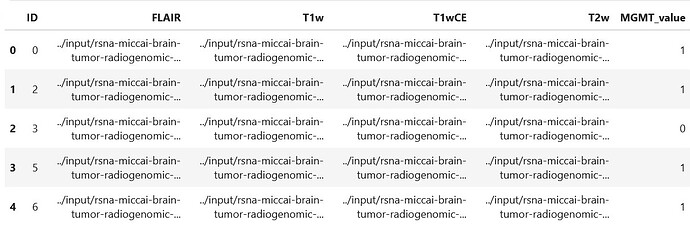Hello Everyone,
I am fairly new to fastai and I apologize if this problem seems fairly rudimentary. I’ve been struggling with this for a couple of days now and no amount of breaking my head or trawling google and these forums has helped.
My task involves creating a binary classifier for DICOM images. My code is as follows:
mgmt = DataBlock(blocks=(ImageBlock(cls=PILDicom), CategoryBlock),
get_x=lambda x: Path(x[4]),
splitter=RandomSplitter(valid_pct=0.2, seed=42),
get_y=lambda x:x[5],
item_tfms = [Resize(size= 512, resamples= (Image.NONE,0))],
batch_tfms=[*aug_transforms(size=224),Normalize.from_stats(*imagenet_stats)])
dls = mgmt.dataloaders(df.values)
learn = cnn_learner(dls, resnet34, metrics = accuracy)
Everything works just fine till here. I’ve followed the fast ai medical imaging tutorial to get to this point. The next bit is where everything breaks.
learn.fit_one_cycle(1)
This throws up a massive error:
---------------------------------------------------------------------------
RuntimeError Traceback (most recent call last)
<ipython-input-65-4dfb24161c57> in <module>
----> 1 learn.fit_one_cycle(1)
/opt/conda/lib/python3.7/site-packages/fastai/callback/schedule.py in fit_one_cycle(self, n_epoch, lr_max, div, div_final, pct_start, wd, moms, cbs, reset_opt)
110 scheds = {'lr': combined_cos(pct_start, lr_max/div, lr_max, lr_max/div_final),
111 'mom': combined_cos(pct_start, *(self.moms if moms is None else moms))}
--> 112 self.fit(n_epoch, cbs=ParamScheduler(scheds)+L(cbs), reset_opt=reset_opt, wd=wd)
113
114 # Cell
/opt/conda/lib/python3.7/site-packages/fastai/learner.py in fit(self, n_epoch, lr, wd, cbs, reset_opt)
209 self.opt.set_hypers(lr=self.lr if lr is None else lr)
210 self.n_epoch = n_epoch
--> 211 self._with_events(self._do_fit, 'fit', CancelFitException, self._end_cleanup)
212
213 def _end_cleanup(self): self.dl,self.xb,self.yb,self.pred,self.loss = None,(None,),(None,),None,None
/opt/conda/lib/python3.7/site-packages/fastai/learner.py in _with_events(self, f, event_type, ex, final)
158
159 def _with_events(self, f, event_type, ex, final=noop):
--> 160 try: self(f'before_{event_type}'); f()
161 except ex: self(f'after_cancel_{event_type}')
162 self(f'after_{event_type}'); final()
/opt/conda/lib/python3.7/site-packages/fastai/learner.py in _do_fit(self)
200 for epoch in range(self.n_epoch):
201 self.epoch=epoch
--> 202 self._with_events(self._do_epoch, 'epoch', CancelEpochException)
203
204 def fit(self, n_epoch, lr=None, wd=None, cbs=None, reset_opt=False):
/opt/conda/lib/python3.7/site-packages/fastai/learner.py in _with_events(self, f, event_type, ex, final)
158
159 def _with_events(self, f, event_type, ex, final=noop):
--> 160 try: self(f'before_{event_type}'); f()
161 except ex: self(f'after_cancel_{event_type}')
162 self(f'after_{event_type}'); final()
/opt/conda/lib/python3.7/site-packages/fastai/learner.py in _do_epoch(self)
194
195 def _do_epoch(self):
--> 196 self._do_epoch_train()
197 self._do_epoch_validate()
198
/opt/conda/lib/python3.7/site-packages/fastai/learner.py in _do_epoch_train(self)
186 def _do_epoch_train(self):
187 self.dl = self.dls.train
--> 188 self._with_events(self.all_batches, 'train', CancelTrainException)
189
190 def _do_epoch_validate(self, ds_idx=1, dl=None):
/opt/conda/lib/python3.7/site-packages/fastai/learner.py in _with_events(self, f, event_type, ex, final)
158
159 def _with_events(self, f, event_type, ex, final=noop):
--> 160 try: self(f'before_{event_type}'); f()
161 except ex: self(f'after_cancel_{event_type}')
162 self(f'after_{event_type}'); final()
/opt/conda/lib/python3.7/site-packages/fastai/learner.py in all_batches(self)
164 def all_batches(self):
165 self.n_iter = len(self.dl)
--> 166 for o in enumerate(self.dl): self.one_batch(*o)
167
168 def _do_one_batch(self):
/opt/conda/lib/python3.7/site-packages/fastai/data/load.py in __iter__(self)
107 self.before_iter()
108 self.__idxs=self.get_idxs() # called in context of main process (not workers/subprocesses)
--> 109 for b in _loaders[self.fake_l.num_workers==0](self.fake_l):
110 if self.device is not None: b = to_device(b, self.device)
111 yield self.after_batch(b)
/opt/conda/lib/python3.7/site-packages/torch/utils/data/dataloader.py in __next__(self)
433 if self._sampler_iter is None:
434 self._reset()
--> 435 data = self._next_data()
436 self._num_yielded += 1
437 if self._dataset_kind == _DatasetKind.Iterable and \
/opt/conda/lib/python3.7/site-packages/torch/utils/data/dataloader.py in _next_data(self)
1063 if len(self._task_info[self._rcvd_idx]) == 2:
1064 data = self._task_info.pop(self._rcvd_idx)[1]
-> 1065 return self._process_data(data)
1066
1067 assert not self._shutdown and self._tasks_outstanding > 0
/opt/conda/lib/python3.7/site-packages/torch/utils/data/dataloader.py in _process_data(self, data)
1109 self._try_put_index()
1110 if isinstance(data, ExceptionWrapper):
-> 1111 data.reraise()
1112 return data
1113
/opt/conda/lib/python3.7/site-packages/torch/_utils.py in reraise(self)
426 # have message field
427 raise self.exc_type(message=msg)
--> 428 raise self.exc_type(msg)
429
430
RuntimeError: Caught RuntimeError in DataLoader worker process 1.
Original Traceback (most recent call last):
File "/opt/conda/lib/python3.7/site-packages/torch/utils/data/_utils/worker.py", line 198, in _worker_loop
data = fetcher.fetch(index)
File "/opt/conda/lib/python3.7/site-packages/torch/utils/data/_utils/fetch.py", line 34, in fetch
data = next(self.dataset_iter)
File "/opt/conda/lib/python3.7/site-packages/fastai/data/load.py", line 118, in create_batches
yield from map(self.do_batch, self.chunkify(res))
File "/opt/conda/lib/python3.7/site-packages/fastai/data/load.py", line 144, in do_batch
def do_batch(self, b): return self.retain(self.create_batch(self.before_batch(b)), b)
File "/opt/conda/lib/python3.7/site-packages/fastai/data/load.py", line 143, in create_batch
def create_batch(self, b): return (fa_collate,fa_convert)[self.prebatched](b)
File "/opt/conda/lib/python3.7/site-packages/fastai/data/load.py", line 50, in fa_collate
else type(t[0])([fa_collate(s) for s in zip(*t)]) if isinstance(b, Sequence)
File "/opt/conda/lib/python3.7/site-packages/fastai/data/load.py", line 50, in <listcomp>
else type(t[0])([fa_collate(s) for s in zip(*t)]) if isinstance(b, Sequence)
File "/opt/conda/lib/python3.7/site-packages/fastai/data/load.py", line 49, in fa_collate
return (default_collate(t) if isinstance(b, _collate_types)
File "/opt/conda/lib/python3.7/site-packages/torch/utils/data/_utils/collate.py", line 55, in default_collate
return torch.stack(batch, 0, out=out)
File "/opt/conda/lib/python3.7/site-packages/fastai/torch_core.py", line 329, in __torch_function__
res = super().__torch_function__(func, types, args=args, kwargs=kwargs)
File "/opt/conda/lib/python3.7/site-packages/torch/tensor.py", line 995, in __torch_function__
ret = func(*args, **kwargs)
RuntimeError: result type Float can't be cast to the desired output type Int
The gist of which is: Float can’t be cast to the desired output type Int. I’ve tried converting the y labels to float/int(as suggested on someone’s post on Stack), but to no avail. It feels like the solution has to be something really stupid and silly, but I’m at my wits ends now. Please help.


